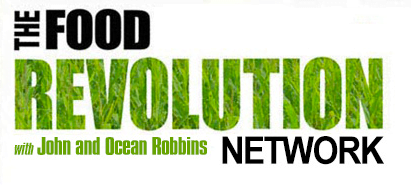
And even fewer pleasures greater than when it’s two of the dearest people you know succeeding in one of the most beautiful projects.
My dear friend Ocean Robbins and his father John Robbins (author of Diet for a New America, The Food Revolution and many others) are now working together to create, for the second year in a row, The Food Revolution Summit – a tele-summit dedicated to exploring the cutting edge of what’s happening around food issues globally from the lenses of health, politics and philosophy (and from the most trusted advocates and experts of our time).
Ocean and I have worked together, on and off, for the past 18 years with the group he co-founded Youth for Environmental Sanity. He started out speaking to hundreds of thousands of students in high schools across North America, and then lead summer camps, and then gatherings of leading young changemakers and now is focusing almost entirely on growing this new social enterprise with his father. I couldn’t be happier for them.
This is a fine example of how to become a hub.
You can get more info on the summit here.
And what follows is my interview with Ocean about The Food Revolution Summit from a marketing lense.
*

More than 30,000 people from 100+ countries participated in the first Food Revolution Summit, and response was amazing. Our affiliates were thrilled with the results, too. One person mailed to his list of 50,000, and wound up earning more than $10,000. And since the summit, our list has continued to expand. Popular blog posts and an online petition calling for labeling of GMOs have drawn us lots of attention. Our list is now more than 80,000.
What’s the story of how this came about? What was the need you saw in the community that it emerged from?
Our food chain is in crisis. Big agribusiness has made profits more important than your health — more important than the environment — more important than your right to know how your food is produced. Large-scale industrial agribusiness is controlling an expanding share of the world’s food supply. They have huge advertising budgets to market highly processed, genetically engineered, chemical-laden, pesticide-contaminated pseudo-foods. Meanwhile, people keep getting sicker. Disease care is now eating up 20% of US GDP, and more and more people are chronically ill.
But beneath the surface, a revolution is growing.
From rural farms to urban dinner plates, from grocery store shelves to state ballot boxes, people are rising up and taking action. We’re reclaiming our food systems and our menus, and we’re taking responsibility for our health.
Today there’s a huge and growing demand for food that is organic, sustainable, fair trade, non-GMO, humane, and healthy. In cities around the world, we’re seeing more and more farmer’s markets, and more young people getting back into farming. Grocery stores (even big national chains) are displaying local, natural and organic foods with pride. The movements for healthy food are growing fast, and starting to become a political force.
Can you share a few examples of how your project works?
The Food Revolution Summit: Over the course of nine days, we gather together leading insights from some of the world’s brilliant scientists, doctors and nutritionists. We conduct 24 inspiring, galvanizing and deeply informative interviews, and broadcast those interviews worldwide. Folks can listen for free to the interviews, online or through teleconference. They can also purchase an optional Empowerment Package that gave them downloadable recordings, transcripts, and a whole collection of bonus items, for a fee. Sales of the Empowerment Package cover program costs and also inspire affiliates to promote the summit to their lists, since they can earn up to 50% of any resultant downstream sales. We offer a free service widely, we earn enough to make the program profitable and to make it a win for our promotional partners, and we offer real value every step of the way.
Who do you find it’s working best for?
A survey found that our 2012 Food Revolution Summit participants were highly motivated, and the majority were 40 and 50-something women. There was strong international representation, with a majority in the United States and Canada. Many of them already know that our food system is messed up, they’ve already eliminated most junk food, white bread, and trans fats from their diet. They already know that their food choices affect animals and the planet. But they’re frustrated with the world around them. They want to be armed with the facts so they can become effective spokespeople and advocates. They want to know how to influence people, how to help their families and loved ones be less sick, and even how to change government policy to stop tilting the playing field to favor the pesticide and junk food companies over family farms and healthy foods.
How did you promote this in the beginning? What were the top three most successful approaches at the start of it?
We lined up great speakers. That was enabled by the fact that my dad and colleague, John Robbins, is a bestselling author in this field, and literally wrote the book, “The Food Revolution”, in 2001. So we had strong content and some degree of prominence to start things off.
Then we created strong, authentic and effective landing page and sales copy. This is not something that came easily to me. I needed a lot of help, and was lucky enough to find good people who could offer it. It doesn’t matter how many people click on your page, if it doesn’t motivate them to sign up and to take the next steps. Also affiliates won’t want to promote a page unless they think it is well done.
Third, we reached out to affiliates who had shared values and big lists, and invited them into partnership. By offering them the chance to promote a great project, that was smartly presented, and giving them half of any resultant revenues while offering to do all the followup sales path work so they could just promote the free summit, we made it easy for them to say yes.
What are the top three most effective ways you’ve found to market this?
Affiliates.
Good copy.
Focusing mostly on content with our list, so we offer lots of stuff for free, and are clearly driven by mission first. This is our integrity, and it’s also building trust.
Writing compelling copy that doesn’t come across as icky or read like a “sales letter” is a tricky business and I am still learning about it.
Five of the most popular emails I have sent our list have been:
What are the three biggest lessons you’ve learned along the way?
Writing good sales copy is a skill set. There’s a lot that’s been learned about it. We aren’t born with it, and for most of us, it doesn’t come intuitively, either.
Combining awesome free content with a strong opt-in hook is a great way to build a list. A big list of engaged, inspired, and interested people is a powerful force for social change and for business success.
Affiliates represent an awesome way to turn the competition into partners.
At its heart, what is this project/business really about for you? (beyond money, status and such).
Large-scale industrialized food production is wreaking havoc on our forests, topsoil, air, water, and climate. Farm animals are being treated with tremendous cruelty, and farm workers are often exploited. Genetically engineered “Frankenfoods” are being released, inadequately tested, into the food supply on a vast scale. Meanwhile, people are eating more and more artificial food — and getting fatter and sicker. In fact, more people are chronically ill today than at any time in the history of the world.
Our goal is to offer a diverse, gourmet, tasty and nutrient-rich powerhouse of resources that’s designed to help people move from being medical time bombs to health superstars, and from frustrated spectators to empowered agents of change.
I’m also motived by the fact that I love food. I love eating it, I love preparing it, and I love sharing it with other people. Throughout the world, “breaking bread” together, or sharing a meal together, is an act of connection. Food bonds us to the world, to culture, and to one another.
When we bring more consciousness to our relationship with food, we improve our health, and we contribute to a more healthy, humane, sustainable and beautiful world.
What’s the next level for your project? What are you most excited about that’s coming up?
The 2013 Food Revolution Summit runs April 27-May 5, and it’s going to be our best one yet!
We’ve compiled a book of interviews from the Food Revolution Summit, and edited them to make for a strong and cohesive flow. Voices of the Food Revolution will be published in June, 2013.
We’re also developing online courses, and offering free weekly emails to our growing list, with action alerts, practical tools, inspiration and information to contribute to the food revolution.
If people want to find out more about your project, support it or get involved – what should they do?
Join us at http://www.foodrevolution.org, or sign up for our free 2013 Food Revolution Summit at http://www.foodrevolution.org/
Anything else you’d like to add?
We wish you radiant health, abundant joy, and a life filled with meaning. And we wish you good, delicious, nourishing food. If you’d like to become an affiliate and earn a modest amount of money while helping spread the word, you can sign up here: http://www.foodrevolution.org/
Bon Appetit, food revolutionaries!